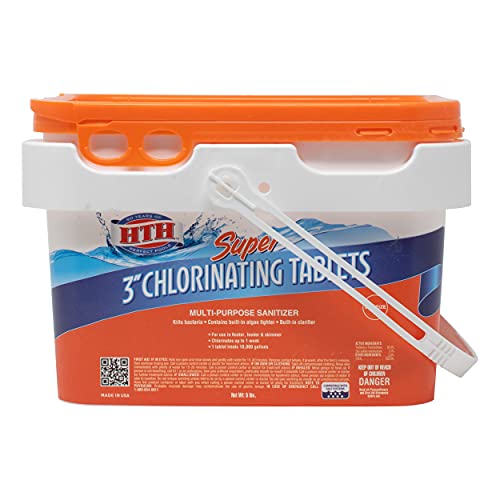One of the most popular types of chlorine to use in your swimming pool is trichlor.
On the surface, trichlor serves one purpose—to sanitize the pool. However, secondary factors of using trichlor may cause some unintended unintended problems if it is used over a long period of time.
So, what exactly is trichlor? And should it be my primary source of chlorine?
What is Trichlor?
Trichlor, scientifically known as Trichloro-S-Triazinetrione or Trichloroisocyanuric acid, is a highly concentrated form of chlorine. They are most commonly found as 1″ to 3″ tablets.
Whenever you hear pool owners or pool store associates refer to “tabs,” “tablets,” or “pucks,” they are usually referring to trichlor.
5-lb container of HTH Super Chlorinating Tablets for swimming pools.
How is Trichlor Made?
Trichlor contains about 90% active chlorine. Except for actual chlorine gas, it is the most concentrated form of chlorine on the market.
It is also a form of “stabilized” chlorine. It is made with cyanuric acid (CYA) for added protection against the sun and UV rays.
Because of its acidic composition, it has a very low pH level of about 3. Basically, using trichlor pucks will lower both pH and total alkalinity (TA) levels, and increase CYA over time. Keep that in mind, and always test your water to ensure your levels are balanced!
How Does Trichlor Work And How Should it be Used?
There is a reason why trichlor tablets are one of the most popular forms of sanitation: they are very easy to use. It is almost like a “set it and forget it” system.
When put in a pool, the pucks slowly dissolve and convert into hydrochloric acid that combines with and attacks microorganisms in the water.
Trichlor is also highly corrosive, so it should never be put directly into the pool, as it can stain the pool surface. It should also not be put directly into the skimmer.
It is recommended that pucks be put in a floating dispenser or automatic chlorinator to ensure they are dispersed properly in the water.
Large chlorine dispenser for 3-inch tablets to use in your swimming pool.
NOTE: To know how much trichlor to add to your pool, use our pool chlorine calculator.
Should Trichlor Be Your Everyday Chlorine Choice?
The practicality of trichlor is very appealing. Not worrying about constantly chlorinating the pool seems like a positive.
However, it is important to know some of the drawbacks of using tablets and compare them to the positives.
Advantages
- At 90% concentration, trichlor is easily the most effective and best “bang for your buck” when it comes to sanitation. You will also need less of it when compared to liquid chlorine or cal hypo.
- Because it is so popular, pretty much any pool store and big box store will have tablets available.
- It has a very long shelf-life compared to other forms of chlorine. Rarely will it lose its overall strength over time.
- It is super convenient and easy to work with. Just put the recommended amount of tabs in a dispenser or chlorinator and that is all there is to it.
Disadvantages
- Since trichlor is highly acidic, constant use of tablets will lower pH and TA levels. You must be vigilant and stay on top of testing, or else your pool water can become too acidic. This can lead to corrosion of equipment and staining.
- Being a stabilized form of chlorine means that CYA will be added to the pool with each tablet used. Trichlor is over 50% CYA by weight, so levels can rise pretty quickly. Higher levels of CYA will force you to use even more chlorine and the cycle will not end unless some water is drained (the only way to lower CYA in a pool is by draining and refilling with fresh water).
- Trichlor can only be used for daily chlorination. It should not be used for shocking the pool. As mentioned above, trichlor is slowly dissolving and the addition of CYA will take even longer for the chlorine to burn off. Shocking should be done with cal-hypo or liquid chlorine.
Should I Continue to Use Trichlor Tablets?
There is no question that trichlor can have an important role in chlorinating your pool. For pool owners who don’t have the time or patience to continuously maintain their pool, tablets are a lifesaver. It is a perfect sanitizer for that purpose.
However, the disadvantages outweigh the advantages in terms of everyday use. Unless you are extremely vigilant in your testing or you enjoy draining and refilling water monthly, you should use trichlor as a supplement to another form of chlorine. The convenience can turn into inconvenience real quick!
If you’re pH and TA levels are high and CYA is a bit low, then throwing some tablets in your dispenser is a great idea. When you are away for a long weekend or need to leave the pool unattended for a longer stretch of time, trichlor is an ideal solution.
If trichlor is your preferred choice of chlorination, just make sure that you are testing, testing, testing! And when you are done, test some more!


